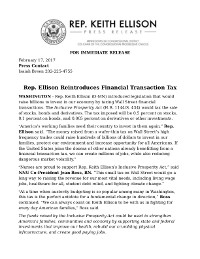Press Release
Nurses Applaud Keith Ellison on Renewed Bill to Set Fee on Wall Street Speculation

Robin Hood Tax Could Raise $300 Billion a Year in Needed Funds
National Nurses United today welcomed the re-introduction of federal legislation from Rep. Keith Ellison with 17 House co-sponsors, that could raise hundreds of billions of dollars annually to fund critical social needs with a small tax on Wall Street speculation.
Economists estimate that a tiny surcharge of no more than a nickel on every $10 in trades of stocks, bond, and derivatives —a tax that is proportionally smaller than what most Americans pay for a pair of shoes – could increase revenues collected by the Treasury Department by as much as $300 billion annually.
Ellison’s HR 1144, the Inclusive Prosperity Act, is patterned after financial transaction taxes that exist in other global major economic markets. NNU has joined with Ellison and health care and community activists in campaigning for a similar levy, also known as the Robin Hood tax, for several years.
 Click here to read Rep. Ellison's press release
Click here to read Rep. Ellison's press release
“Nurses are proud to support Rep. Keith Ellison’s Inclusive Prosperity Act,” said NNU Co-President Jean Ross, RN. “This small tax on Wall Street would go a long way to raising the revenue for our most vital needs, including living wage jobs, healthcare for all, student debt relief, and fighting climate change.”
“At a time when austerity budgeting is so popular among many in Washington, the Robin Hood tax is the perfect antidote for a fundamental change in direction,” Ross continued. “We can always count on Keith Ellison to be with us in fighting for every day American families,” Ross said.
“America’s working families need their country to invest in them again,” Rep. Ellison said. “The money raised from a wafer-thin tax on Wall Street’s high frequency trades could raise hundreds of billions of dollars to invest in our families, protect our environment and increase opportunity for all Americans. If the United States joins the dozens of other nations already benefiting from a financial transaction tax, we can create millions of jobs, while also reducing dangerous market volatility.”
HR 1144 would not affect households earning less than $75,000 annually. Instead, its principal targets are the wealthiest Americans whose reckless speculation fueled the 2008 recession: bankers, brokers, and rich investors who own most of the nation’s stocks and bonds.
The Robin Hood tax would also slow the growth of automated high frequency trading, which makes the stock market more dangerous. A small tax would make risky HFT unprofitable, and help reduce the excess speculation on commodities like food and gas that drives up prices, which will protect the economy from computer-generated collapses and market manipulation.
Almost 30 nations have some form of a financial transaction tax and the U.S. had a similar tax from 1914 until 1966. The United Kingdom has had a tax on stock trades for decades -- the same rate proposed in HR 1144 and their volume of trading has grown robustly. Eleven nations in the European Union will implement one soon.
In the U.S., the Robin Hood Tax embodies a widespread campaign endorsed by 172 national organizations representing millions of members in unions, student, health, clergy, civil rights, environmental and community organizations, and other consumer and activist groups.
Co-sponsors on the bill including Representatives Raúl M. Grijalva (AZ); Mark Pocan (WI); Earl Blumenauer (OR); Katherine M. Clark and James McGovern (MA); John Conyers, Jr. (MI); Barbara Lee, Ted Lieu, Alan S. Lowenthal Lucille Roybal-Allard and Mark Takano (CA); Rick Nolan (MN); Eddie Bernice Johnson (TX); Eleanor Holmes Norton (DC); John Sarbanes (MD); Jan Schakowsky (IL) and Louise Slaughter (NY).